File Info
| Exam | Splunk Enterprise Certified Admin |
| Number | SPLK-1003 |
| File Name | Splunk.SPLK-1003.CertDumps.2024-08-03.115q.vcex |
| Size | 932 KB |
| Posted | Aug 03, 2024 |
| Download | Splunk.SPLK-1003.CertDumps.2024-08-03.115q.vcex |
How to open VCEX & EXAM Files?
Files with VCEX & EXAM extensions can be opened by ProfExam Simulator.
Coupon: MASTEREXAM
With discount: 20%
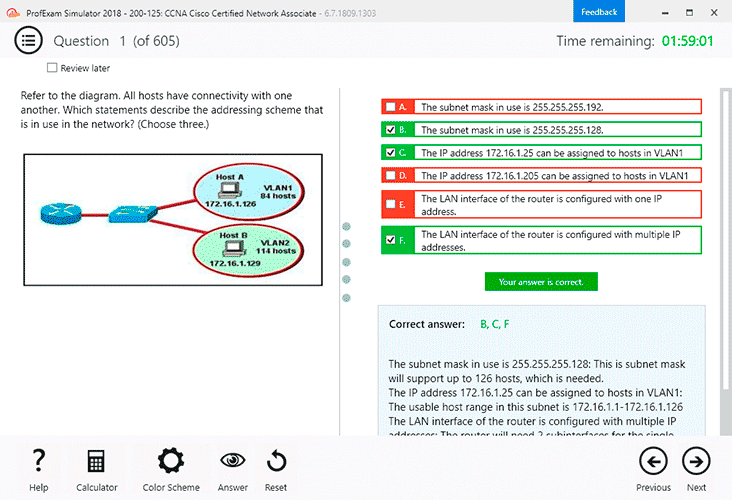
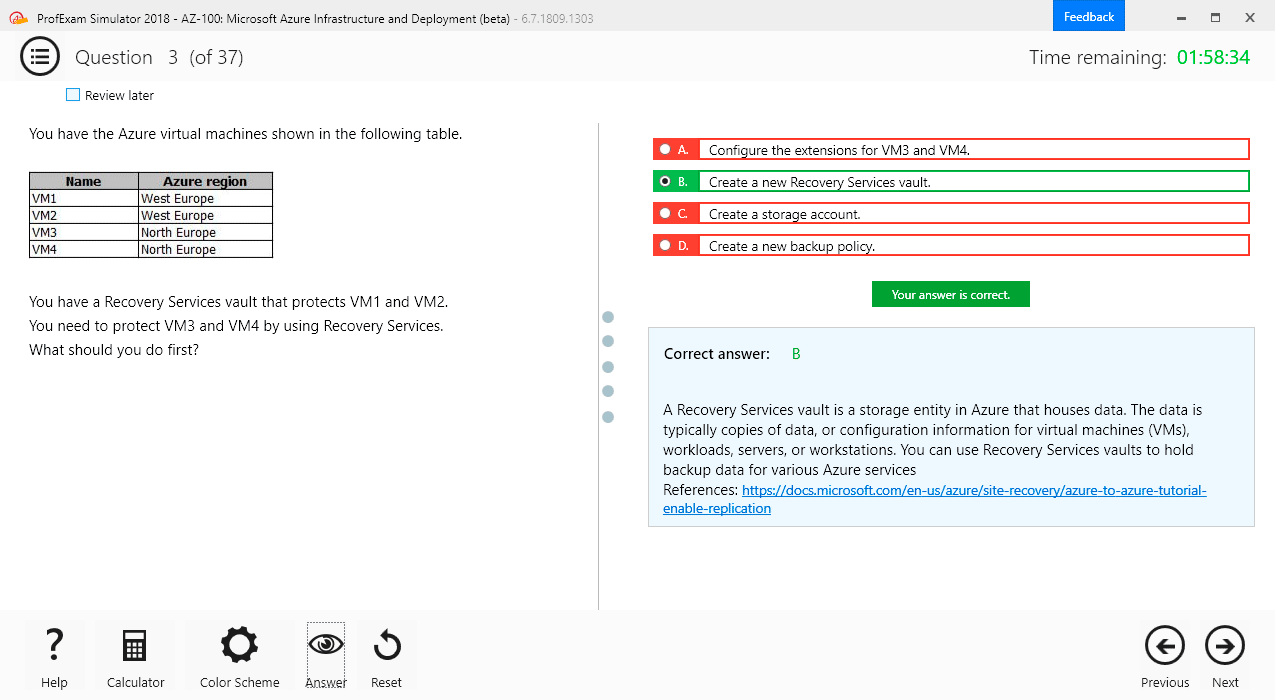
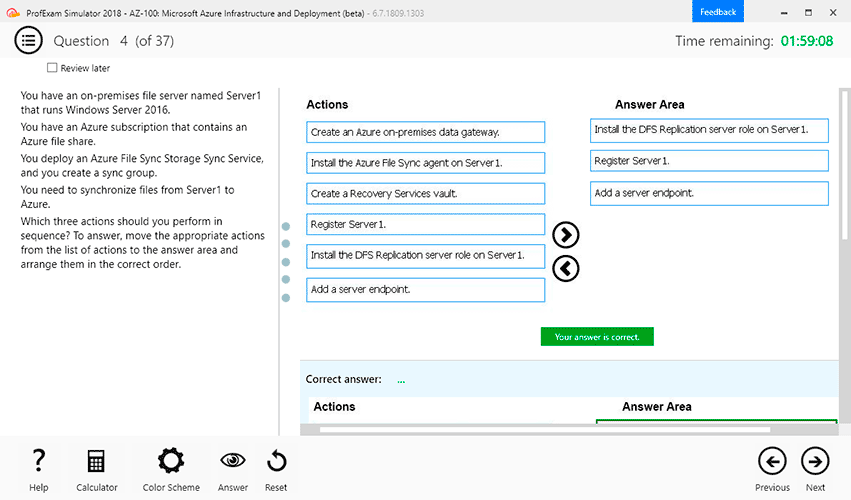
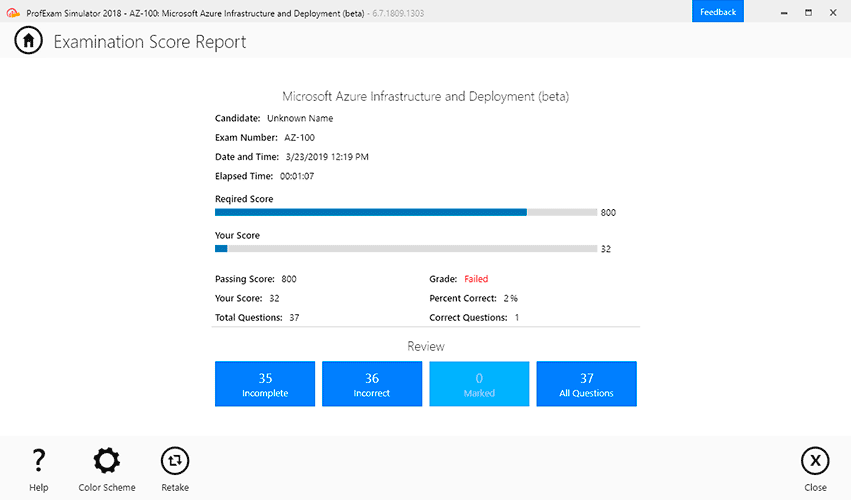
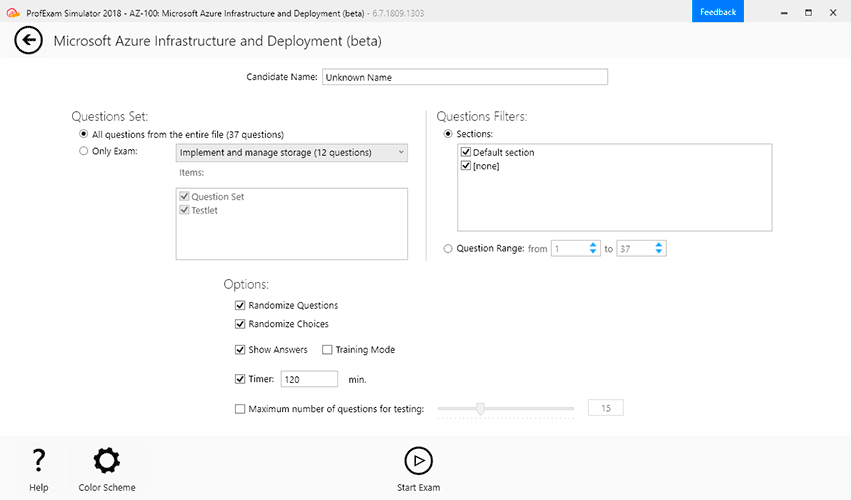
Demo Questions
Question 1

Consider the following stanza in inputs.conf:

What will the value of the source filed be for events generated by this scripts input?
- /opt/splunk/ecc/apps/search/bin/liscer.sh
- unknown
- liscer
- liscer.sh
Correct answer: A
Explanation:
https://docs.splunk.com/Documentation/Splunk/8.2.2/Admin/Inputsconf -Scroll down to source = <string>*Default: the input file path https://docs.splunk.com/Documentation/Splunk/8.2.2/Admin/Inputsconf
-Scroll down to source = <string>
*Default: the input file path
Question 2
Which of the following applies only to Splunk index data integrity check?
- Lookup table
- Summary Index
- Raw data in the index
- Data model acceleration
Correct answer: C
Question 3
The following stanzas in inputs. conf are currently being used by a deployment client:
[udp: //145.175.118.177:1001
Connection_host = dns
sourcetype = syslog
Which of the following statements is true of data that is received via this input?
- If Splunk is restarted, data will be queued and then sent when Splunk has restarted.
- Local firewall ports do not need to be opened on the deployment client since the port is defined in inputs.conf.
- The host value associated with data received will be the IP address that sent the data.
- If Splunk is restarted, data may be lost.
Correct answer: D
Explanation:
This is because the input type is UDP, which is an unreliable protocol that does not guarantee delivery, order, or integrity of the data packets. UDP does not have any mechanism to resend or acknowledge the data packets, so if Splunk is restarted, any data that was in transit or in the buffer may be dropped and not indexed. This is because the input type is UDP, which is an unreliable protocol that does not guarantee delivery, order, or integrity of the data packets. UDP does not have any mechanism to resend or acknowledge the data packets, so if Splunk is restarted, any data that was in transit or in the buffer may be dropped and not indexed.
Question 4
What is the difference between the two wildcards ... and - for the monitor stanza in inputs, conf?
- ... is not supported in monitor stanzas
- There is no difference, they are interchangable and match anything beyond directory boundaries.
- * matches anything in that specific directory path segment, whereas ... recurses through subdirectories as well.
- ... matches anything in that specific directory path segment, whereas - recurses through subdirectories as well.
Correct answer: C
Explanation:
https://docs.splunk.com/Documentation/Splunk/7.3.0/Data/Specifyinputpathswithwildcards... The ellipsis wildcard searches recursively through directories and any number of levels of subdirectories to find matches.If you specify a folder separator (for example, //var/log/.../file), it does not match the first folder level, only subfolders.* The asterisk wildcard matches anything in that specific folder path segment.Unlike ..., * does not recurse through subfolders. https://docs.splunk.com/Documentation/Splunk/7.3.0/Data/Specifyinputpathswithwildcards
... The ellipsis wildcard searches recursively through directories and any number of levels of subdirectories to find matches.
If you specify a folder separator (for example, //var/log/.../file), it does not match the first folder level, only subfolders.
* The asterisk wildcard matches anything in that specific folder path segment.
Unlike ..., * does not recurse through subfolders.
Question 5
When using a directory monitor input, specific source types can be selectively overridden using which configuration file?
- sourcetypes . conf
- trans forms . conf
- outputs . conf
- props . conf
Correct answer: D
Explanation:
When using a directory monitor input, specific source types can be selectively overridden using the props.conf file.According to the Splunk documentation1, ''You can specify a source type for data based on its input and source. Specify source type for an input. You can assign the source type for data coming from a specific input, such as /var/log/. If you use Splunk Cloud Platform, use Splunk Web to define source types. If you use Splunk Enterprise, define source types in Splunk Web or by editing the inputs.conf configuration file.'' However, this method is not very granular and assigns the same source type to all data from an input.To override the source type on a per-event basis, you need to use the props.conf file and the transforms.conf file2.The props.conf file contains settings that determine how the Splunk platform processes incoming data, such as how to segment events, extract fields, and assign source types2.The transforms.conf file contains settings that modify or filter event data during indexing or search time2.You can use these files to create rules that match specific patterns in the event data and assign different source types accordingly2.For example, you can create a rule that assigns a source type of apache_error to any event that contains the word ''error'' in the first line2. When using a directory monitor input, specific source types can be selectively overridden using the props.conf file.According to the Splunk documentation1, ''You can specify a source type for data based on its input and source. Specify source type for an input. You can assign the source type for data coming from a specific input, such as /var/log/. If you use Splunk Cloud Platform, use Splunk Web to define source types. If you use Splunk Enterprise, define source types in Splunk Web or by editing the inputs.conf configuration file.'' However, this method is not very granular and assigns the same source type to all data from an input.To override the source type on a per-event basis, you need to use the props.conf file and the transforms.conf file2.The props.conf file contains settings that determine how the Splunk platform processes incoming data, such as how to segment events, extract fields, and assign source types2.The transforms.conf file contains settings that modify or filter event data during indexing or search time2.You can use these files to create rules that match specific patterns in the event data and assign different source types accordingly2.For example, you can create a rule that assigns a source type of apache_error to any event that contains the word ''error'' in the first line2.
Question 6
A configuration file in a deployed app needs to be directly edited. Which steps would ensure a successful deployment to clients?
- Make the change in $SPLUNK HOME/etc/dep10yment apps/$appName/10ca1/ on the deployment server, and the change will be automatically sent to the deployment clients.
- Make the change in $SPLUNK HOME /etc/apps/$appname/local/ on any of the deployment clients, and then run the command . / splunk reload deploy-server to push that change to the deployment server.
- Make the change in $SPLUNK HOME/etc/dep10yment apps/$appName/10ca1/ on the deployment server, and then run $SPLUNK HOME/bin/sp1unk reload deploy---server.
- Make the change in $SPLUNK HOME/etc/apps/$appName/defau1t on the deployment server, and it will be distributed down to the clients' own local versions.
Correct answer: C
Explanation:
According to the Splunk documentation1, to customize a configuration file, you need to create a new file with the same name in a local or app directory. Then, add the specific settings that you want to customize to the local configuration file. Never change or copy the configuration files in the default directory. The files in the default directory must remain intact and in their original location. The Splunk Enterprise upgrade process overwrites the default directory.To deploy configuration files to deployment clients, you need to use the deployment server.The deployment server is a Splunk Enterprise instance that distributes content and updates to deployment clients2.The deployment server uses a directory called $SPLUNK_HOME/etc/deployment-apps to store the apps and configuration files that it deploys to clients2.To update the configuration files in this directory, you need to edit them manually and then run the command $SPLUNK_HOME/bin/sp1unk reload deploy---server to make the changes take effect2.Therefore, option A is incorrect because it does not include the reload command. Option B is incorrect because it makes the change on a deployment client instead of the deployment server. Option D is incorrect because it changes the default directory instead of the local directory. According to the Splunk documentation1, to customize a configuration file, you need to create a new file with the same name in a local or app directory. Then, add the specific settings that you want to customize to the local configuration file. Never change or copy the configuration files in the default directory. The files in the default directory must remain intact and in their original location. The Splunk Enterprise upgrade process overwrites the default directory.
To deploy configuration files to deployment clients, you need to use the deployment server.The deployment server is a Splunk Enterprise instance that distributes content and updates to deployment clients2.The deployment server uses a directory called $SPLUNK_HOME/etc/deployment-apps to store the apps and configuration files that it deploys to clients2.To update the configuration files in this directory, you need to edit them manually and then run the command $SPLUNK_HOME/bin/sp1unk reload deploy---server to make the changes take effect2.
Therefore, option A is incorrect because it does not include the reload command. Option B is incorrect because it makes the change on a deployment client instead of the deployment server. Option D is incorrect because it changes the default directory instead of the local directory.
Question 7
Which of the following types of data count against the license daily quota?
- Replicated data
- splunkd logs
- Summary index data
- Windows internal logs
Correct answer: D
Explanation:
https://docs.splunk.com/Documentation/Splunk/8.0.3/Admin/Distdeploylicenses#Clustered_deployments_and_licensing_issuesReference: https://community.splunk.com/t5/Deployment-Architecture/License-usage-in-Indexer-Cluster/m-p/493548 https://docs.splunk.com/Documentation/Splunk/8.0.3/Admin/Distdeploylicenses#Clustered_deployments_and_licensing_issues
Reference: https://community.splunk.com/t5/Deployment-Architecture/License-usage-in-Indexer-Cluster/m-p/493548
Question 8
Which of the following is a valid distributed search group?
- [distributedSearch:Paris] default = false servers = server1, server2
- [searchGroup:Paris] default = false servers = server1:8089, server2:8089
- [searchGroup:Paris] default = false servers = server1:9997, server2:9997
- [distributedSearch:Paris] default = false servers = server1:8089; server2:8089
Correct answer: D
Explanation:
https://docs.splunk.com/Documentation/Splunk/9.0.0/DistSearch/Distributedsearchgroups https://docs.splunk.com/Documentation/Splunk/9.0.0/DistSearch/Distributedsearchgroups
Question 9
Where are license files stored?
- $SPLUNK_HOME/etc/secure
- $SPLUNK_HOME/etc/system
- $SPLUNK_HOME/etc/licenses
- $SPLUNK_HOME/etc/apps/licenses
Correct answer: C
Question 10
In which scenario would a Splunk Administrator want to enable data integrity check when creating an index?
- To ensure that hot buckets are still open for writes and have not been forced to roll to a cold state
- To ensure that configuration files have not been tampered with for auditing and/or legal purposes
- To ensure that user passwords have not been tampered with for auditing and/or legal purposes.
- To ensure that data has not been tampered with for auditing and/or legal purposes
Correct answer: D


